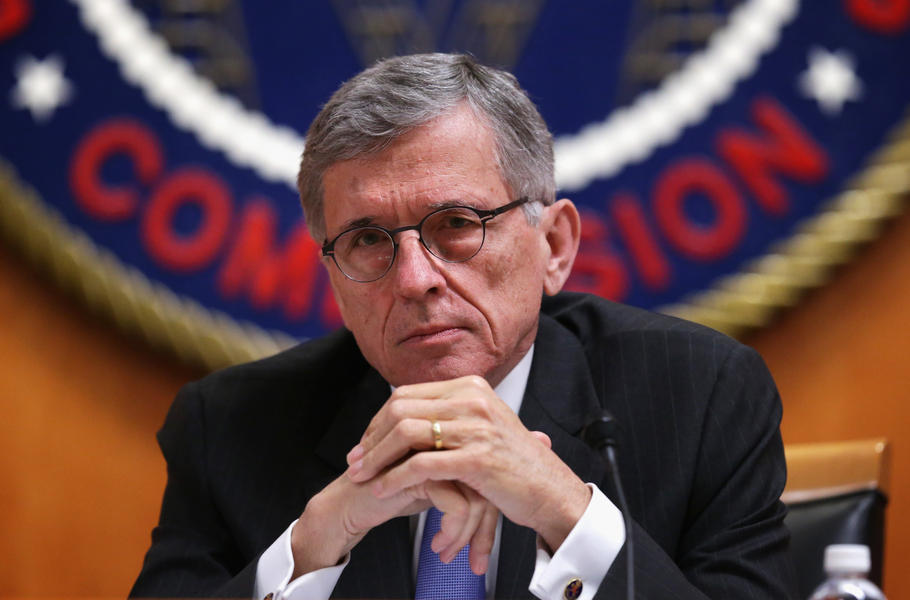The FCC chairman thinks your internet is too slow and too expensive


A free daily email with the biggest news stories of the day – and the best features from TheWeek.com
You are now subscribed
Your newsletter sign-up was successful
On Thursday, Federal Communications Commission Chairman Tom Wheeler said what maybe should be obvious to every American with an internet connection: Broadband internet in the U.S. is too slow and hampered by a lack of competition. More than half of U.S. consumers have only one choice for high-speed internet (more than 25 Mbps), he said at tech incubator 1776, so "there is simply no competitive choice for most Americans."
Wheeler's acknowledgment about a lack of competition may seem mundane, but it's "a fairly radical statement at the FCC," says Amy Schatz at Re/Code. And unlike most Americans, Wheeler can do something about it. He didn't propose any competition-boosting ideas on Thursday, but there is one thing he can do in the short term to at least not decrease competition: Block Comcast's purchase of No. 2 rival Time Warner Cable. The FCC is also considering whether to try to enforce popular net neutrality rules or open up special channels for paying internet services.
Wheeler didn't seem too keen on new rules, saying that "as must be clear by now, incentivizing competition should precede regulation." But his speech was still welcomed by net neutrality advocates. "Looking across the broadband landscape, we can only conclude that, while competition has driven broadband deployment, it has not yet done so in a way that necessarily provides competitive choices for most Americans," Wheeler said. It will be interesting to see what he plans to do about it.
The Week
Escape your echo chamber. Get the facts behind the news, plus analysis from multiple perspectives.

Sign up for The Week's Free Newsletters
From our morning news briefing to a weekly Good News Newsletter, get the best of The Week delivered directly to your inbox.
From our morning news briefing to a weekly Good News Newsletter, get the best of The Week delivered directly to your inbox.
A free daily email with the biggest news stories of the day – and the best features from TheWeek.com
Peter has worked as a news and culture writer and editor at The Week since the site's launch in 2008. He covers politics, world affairs, religion and cultural currents. His journalism career began as a copy editor at a financial newswire and has included editorial positions at The New York Times Magazine, Facts on File, and Oregon State University.
-
 Political cartoons for February 22
Political cartoons for February 22Cartoons Sunday’s political cartoons include Black history month, bloodsuckers, and more
-
 The mystery of flight MH370
The mystery of flight MH370The Explainer In 2014, the passenger plane vanished without trace. Twelve years on, a new operation is under way to find the wreckage of the doomed airliner
-
 5 royally funny cartoons about the former prince Andrew’s arrest
5 royally funny cartoons about the former prince Andrew’s arrestCartoons Artists take on falling from grace, kingly manners, and more
-
 Nobody seems surprised Wagner's Prigozhin died under suspicious circumstances
Nobody seems surprised Wagner's Prigozhin died under suspicious circumstancesSpeed Read
-
 Western mountain climbers allegedly left Pakistani porter to die on K2
Western mountain climbers allegedly left Pakistani porter to die on K2Speed Read
-
 'Circular saw blades' divide controversial Rio Grande buoys installed by Texas governor
'Circular saw blades' divide controversial Rio Grande buoys installed by Texas governorSpeed Read
-
 Los Angeles city workers stage 1-day walkout over labor conditions
Los Angeles city workers stage 1-day walkout over labor conditionsSpeed Read
-
 Mega Millions jackpot climbs to an estimated $1.55 billion
Mega Millions jackpot climbs to an estimated $1.55 billionSpeed Read
-
 Bangladesh dealing with worst dengue fever outbreak on record
Bangladesh dealing with worst dengue fever outbreak on recordSpeed Read
-
 Glacial outburst flooding in Juneau destroys homes
Glacial outburst flooding in Juneau destroys homesSpeed Read
-
 Scotland seeking 'monster hunters' to search for fabled Loch Ness creature
Scotland seeking 'monster hunters' to search for fabled Loch Ness creatureSpeed Read
